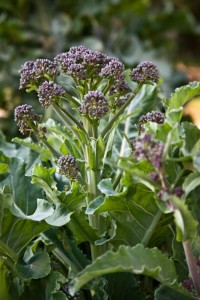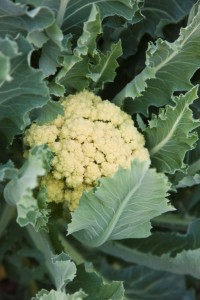We have been harvesting the Roman broccoli, known to the modern gardener as purple sprouting broccoli, for several weeks now. This is the most ancient form of broccoli; the modern large headed green broccoli is a new comer and only reached the general market in the 1930’s. Unlike the modern broccoli, purple broccoli is a biennial, meaning it must go through a winter season to form its florets. Planted in the spring it produces only leaves. This was explained by John Laurence in 1727: “The Brocauli is an Italian Plant, brought lately from Rome by the present Earl of Burlington, who has given it a Reputation among those who love Novelties. Although it is of the Cauli Kind; yet it requires a particular Management, and therefore particular Directions. Many ignorant of the Plant, will be sowing it in the Spring; but it should not be sown till about Midsummer, and not much after…that it may attain Strength to get over the Winter.”
The heads are smaller but more prolific, the stems eat as well as the florets and in my opinion is a much sweeter and tenderer broccoli than is the modern variety. It is also preferred by the organic gardener as the caterpillar of the cabbage white butterfly is much easier to clean from the florets should you be bothered by this pernicious pest.
More delicate and rarer than the Roman broccoli is what gardeners call the Naples, Neapolitan or cauliflower broccoli. James Justice, author of British Gardener’s New Director (1771) declared: “I prefer the White Brocoli, or what is called the Neopolitan Brocoli…it is a crop [that] will hold [remain good] for a considerable time, and many persons esteem them more than they do the best Collyflowers.” Although it is remarkably similar in appearance to the cauliflower, the taste is distinctly broccoli-like. Like the Roman broccoli, it too, must be planted in the fall for a spring harvest.
For a complete explanation of broccoli and its kinds you are invited to examine: Vegetable Gardening the Colonial Williamsburg way, 18th century methods for today’s organic gardeners (Rodale Press)


Leave a Reply